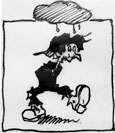Helping someone (or yourself) through depression may be a challenge, but it can be done.
 We’re recovering. We should feel good about it, right?
We’re recovering. We should feel good about it, right?
All too many of us don’t “feel good”–in fact, we’re depressed. The only thing that keeps us sober is the knowledge that drinking will just make it worse, not better.
Depression is a frequent side effect of early recovery, and it’s also one of the most common illnesses that seems to “hold hands” with addiction. We’ll be publishing more on the topic in our upcoming “Addiction and…” series of articles.
In the mean time, here’s some words “from the heart” by a depression sufferer: Helpful tips for anyone who wants to help depression sufferer in recovery.
- Don’t ask me how I feel. Even trying to explain makes my stress level go up.
- It helps when you’re kind to me. But inside, I may be beating myself up for not being able to reciprocate, because I know I “should.” So… be kind, and move on, knowing I appreciate it, but can’t always respond.
- It’s more helpful to me to see you enjoying yourself and being happy, than to have you express concern about my lack of happiness. Feeling as though I’m a “wet blanket” and a reason for you to be concerned only makes me feel worse.
- Please don’t point out the many things that “should” make me happy. I know about them, but I can’t feel them, and the knowledge that I “should” be experiencing something I can’t adds to my negative feelings.
- Don’t allow me to isolate, but be gentle about it. Be near me without demanding I engage with you. Short exchanges that focus me on something external help even if they make me a little cranky sometimes.
- If I seem to be getting worse, tell me factually about the symptoms you observe, and express your concern without being too intense.
- If I do reach out, it’s significant. Listen with attention, and offer me your best response.
- Remember I care about you even though I can’t express it or feel it the way I think I “should.”
Most depression eases as recovery progresses. Medication may help, and we shouldn’t automatically rule it out because it’s “taking pills.” Some pills are okay, if we take them under supervision and according to directions.
Depression is a tough one. Our support groups can help. Our counselor or therapist can help. Our families and loved ones can help, if they understand (and if we let them.) We don’t have to go it alone.


 — August 4, 2013 @
— August 4, 2013 @ 



